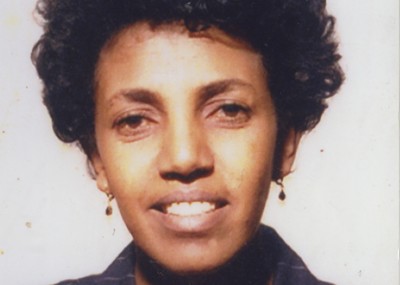Ibrahim’s parents were veteran fighters in Eritrea’s long war for independence from Ethiopia. After it ended in 1991, his mother, Aster Fissehatsion, became a high-profile politician, and his father, Mahmoud Ahmed Sherifo, was appointed Vice-President. In September 2001, both were arrested after criticizing the President, and never heard from again. Ibrahim tells us their story.
(Image above: A rare photograph of Ibrahim with his mother, Aster Fissehatsion, Eritrea, 28 April 1990.)
Like many children of my generation, I was born on the battlefields of Eritrea. In our camouflaged shack – a natural extension of a rocky hill – I spent happy times with my gentle, soft-spoken father and my loving mother. I knew no other life but one filled with stoicism, bravery and camaraderie.
My best friends were other children who were used to life saturated with chaos – explosions, scurrying for safe places during aerial bombardments, being herded in and out of bomb shelters, seeing combatants going to or returning from battlefields. We sang songs for Eritrea – about the history, traditions and struggles of our people.
My parents were freedom fighters, always on military missions that took them away from me. But I felt I lived in luxury because I knew other war-children never saw their parents return.
Life felt like a party
As soon as our freedom fighters liberated Eritrea in May 1991, I moved to the capital, Asmara. Life there was strikingly devoid of fear. I made new friends, attended pre-school, played in the neighbourhood playgrounds.
I was astounded by many things around me. I lived in a household with running water and electricity, wore nice clothes and proper shoes. Life in Asmara felt like a big party.
The President and his cohorts are guilty in the court of conscience; therefore, they are the real prisoners. My parents’ conscience and ideals are roaming free within and beyond the four walls of their cells.
Ibrahim Mahmoud Ahmed Sherifo
The following years were by far the best of my life. But in 1998, as I was about to finish Junior High School, Eritrea went to war against Ethiopia. In 2000, as I moved on to high school, the war was ending, leaving 19,000 young Eritreans dead.
Disharmony among top government and ruling party leaders flared up over this war, which had left Eritrea badly bruised, including with major territorial loss to Ethiopia.
Never seen again
In May 2001, my parents and other government critics were suspended after they published an Open Letter calling for peaceful, democratic dialogue. It sealed my parents’ fate: on 18 September 2001 they were picked up by security agents and never seen again.

I remember my parents with pride and admiration. I don’t know their physical condition, medical needs and psychological state. But they are very much alive in my heart and in my mind. And their ideals will stand the test of time.
The President and his cohorts are guilty in the court of conscience; therefore, they are the real prisoners. My parents’ conscience and ideals are roaming free within and beyond the four walls of their cells.
Take action
Aster Fissehatsion was the only woman among 11 political leaders shut away in Eritrea’s notoriously harsh prisons in September 2001. Sign our petition to free her and tweet Aster’s family a message of support using #FreeAsterNow
Ibrahim is campaigning to free his parents alongside other children of Eritrea’s detainees.
7 facts about Eritrea
- It is the world’s most censored country.
- Over 10,000 people have been detained without charge or trial for political reasons since 1993.
- Many are held in overcrowded underground cells or shipping containers in the desert, suffering extreme heat and cold.
- Around 3,000 people flee the country every month, often to escape indefinite, forced military service.
- Eritreans made up 10% of those risking the deadly Mediterranean Sea crossing to Europe (Jan-end April 2015).
- Ethiopia annexed Eritrea in 1962, sparking a violent independence struggle.
- The rule of Isaias Afewerki, Eritrea’s only president since 1993, is highly autocratic and repressive.
A longer version of this story will appear in the July-September issue of Wire, Amnesty’s global magazine.


